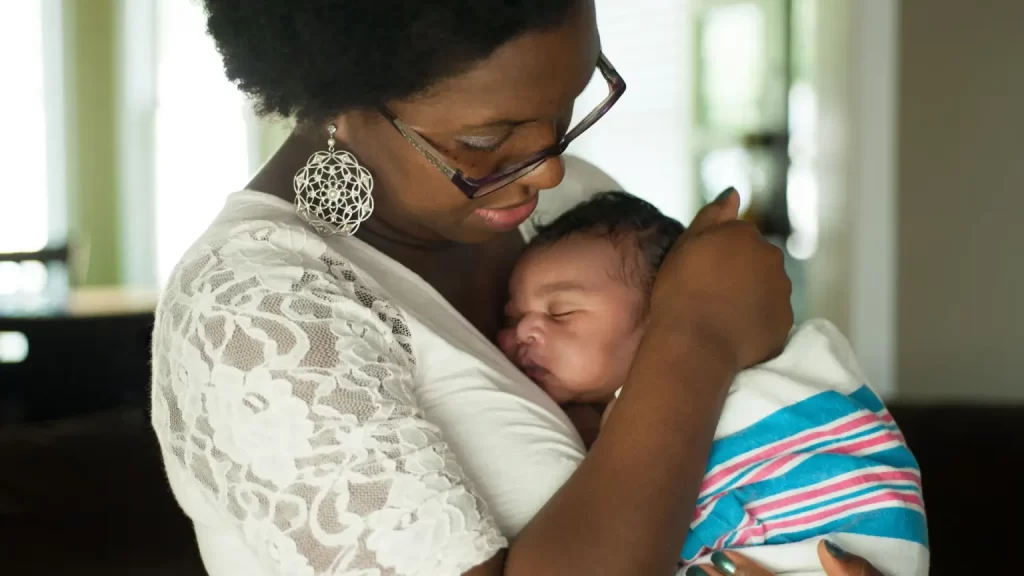Tackling and Flourishing in the First Days of Parenthood

The newborn phase is one of the most profound—and sometimes overwhelming—stages in both a baby’s and a parent’s life. It’s a time filled with rapid growth, tiny triumphs, and a fair share of challenges. The learning curve can feel steep as you dive into chaos of sleepless nights, endless feedings, and constant adjustments.
But don’t worry, you’re not alone in this journey! Understanding what to expect during this time and how to cope with the early days can make the transition to parenthood a little smoother and a lot less intimidating.
Understanding the Newborn Stage

The newborn stage is a whirlwind of emotions, adjustments, and rapid growth. This phase, though fleeting, is one of the most intense periods in a baby’s life. For parents, it’s a time of learning and adapting to the needs of their tiny new family member. Understanding what to expect during these early days can help you navigate this period with more confidence and less stress.
What to Expect in the First Few Weeks
The first few weeks with your newborn baby can feel like a rollercoaster. During this time, your baby is adjusting to life outside the womb, and their tiny body is working hard to regulate various systems. Here’s what you can expect:
- Frequent Feedings:

Newborn babies need to eat every 2-3 hours, which can be exhausting for parents. Whether you’re breastfeeding or formula-feeding, be prepared for round-the-clock feedings.
- Sleep Deprivation:

While newborns sleep a lot, their sleep patterns are unpredictable. This often leads to sleep deprivation for parents, as you’ll be up at all hours tending to your baby’s needs.
- Crying

- Physical Changes: Your baby’s body is undergoing significant changes, such as regulating body temperature and blood sugar levels. These adjustments are crucial for their development and well-being.
Understanding these aspects can help you prepare for the early weeks and manage your expectations. Remember, this phase is temporary, and things will get easier with time.
How Long Does the Newborn Phase Last?

Though it might feel like forever, the newborn phase is pretty short-lived—usually lasting around the first 28 days of your baby’s life according to The American Academy of Pediatrics. During this time, it’s important to monitor your baby’s birth weight to ensure they are gaining weight appropriately and thriving.
During this time, your baby’s body and brain are growing at an astonishing rate, while both of you are getting used to life outside the womb. Parents, too, are learning the ropes of caring for a tiny human, which can feel overwhelming at first, but rest assured, you’ll figure it out as you go!
What Makes the Newborn Phase Challenging? Sleep Deprivation and More
The newborn stage is tough—there’s no way around it. The first few weeks can feel like a blur of constant feedings, late-night crying, and exhaustion. You’re probably not getting much sleep, and the responsibility of caring for your crying baby can sometimes feel all-consuming.

Many parents find that contact naps, where the baby sleeps on them, can help soothe their baby and provide much-needed rest for both. For mothers, physical recovery from childbirth adds another layer of difficulty, making it even harder to juggle everything. But remember, this is all temporary—although it might feel like an eternity when you’re in the thick of it.
Meeting Your Newborn’s Basic Needs
Essential Requirements for Newborn Care
Caring for a newborn involves meeting their basic needs to ensure they thrive. Here are the essential requirements for newborn care:
- Nutrition: Breast milk is often considered the gold standard for newborn nutrition, providing all the necessary nutrients and antibodies. However, formula is a suitable alternative if breastfeeding isn’t an option. The key is to ensure your baby is well-fed and gaining weight appropriately.
- Sleep: Newborn babies need plenty of sleep, but their sleep patterns can be erratic. Establishing a bedtime routine early on can help create a sense of security and promote better sleep habits as they grow.
- Hygiene: Regular diaper changes, gentle baths, and nail care are essential for your baby’s hygiene. Keeping your baby clean and comfortable can prevent rashes and infections.
- Physical Contact: Skin-to-skin contact and cuddling are vital for your baby’s emotional and physical development. These moments of closeness help regulate their body temperature, heart rate, and stress levels, fostering a strong bond between you and your baby.
By focusing on these basic needs, you can create a nurturing environment that supports your baby’s growth and development.
Newborn Development and Milestones

Tracking Your Baby’s Progress
Watching your newborn baby grow and develop is one of the most rewarding aspects of parenthood. Here are some milestones to look forward to:
- Physical Development: Newborn babies grow rapidly, gaining weight, length, and head circumference at an astonishing rate. These changes are a sign of healthy development and should be monitored regularly.
- Cognitive Development: In the early weeks, your baby will start to recognize familiar faces and sounds. They’ll begin to track objects with their eyes and show interest in their surroundings, laying the foundation for future learning.
- Emotional Development: Your baby will start to develop emotional intelligence, responding to your voice and touch. They’ll begin to show preferences for certain people and activities, and you’ll notice the first hints of their unique personality.
Every baby grows and hits milestones at their own pace, so it’s best to cherish their progress without comparing them to others. If you ever have concerns or questions about your little one’s development, reaching out to your pediatrician can provide clarity and reassurance, helping you feel more at ease.
By understanding and supporting your baby’s development, you can help them reach their full potential while enjoying the incredible journey of parenthood.
When Does it Start to Get Easier?

Many parents start to feel a shift around 6 to 8 weeks. By then, babies begin to settle into more predictable sleep patterns, and their feeding and crying routines start to make sense.
As your baby becomes more interactive and responsive, you’ll likely find yourself enjoying the connection with them more. While the early infant stage is still demanding, these small signs of progress can help you feel like you’re getting the hang of things
The Impact on Parents
As your baby hits around 3 to 4 months, things usually begin to feel a little more manageable. It’s important to pay attention to your mental health during this time, as the stress and exhaustion can take a toll. They may sleep for longer stretches at night, providing you with some much-needed uninterrupted sleep.
Adjusting to Life with a Newborn

Life with a newborn can feel like a frenzy. Taking a longer maternity leave can help ease the transition and provide more bonding time with your baby. For many parents, it takes weeks—or even months—before they start to feel comfortable and confident in their new role. As time passes, things slowly get easier.
Your baby might start sleeping for longer stretches, their crying becomes more manageable, and you’ll see them begin to smile, coo (making soft, happy sounds), and show interest in the world around them. These milestones help build your confidence, and soon, the uncertainty you first felt will start to fade.
This adjustment period is totally normal. Don’t hesitate to ask for help when you need it. Whether it’s leaning on your partner, family, friends, or seeking professional support, having a solid support system is key to making this journey smoother. Don’t hesitate to ask someone to watch the baby for a while so you can get some rest or take time for yourself.
Here are some practical tips to help you navigate the early days:
- Expect emotional ups and downs. It’s natural to feel a range of emotions, sometimes within just a few hours. Remember, patience is a virtue. Take things one step at a time and be patient with yourself.
- Get out and about. A change of scenery can do wonders for your mood. Even a quick walk outside can help clear your mind and give you a fresh perspective.
- Let go of perfection. Parenting rarely matches the idealized version we envision. Accept that it’s okay for things to be imperfect, and be kind to yourself along the way.
- Take care of your health. Don’t forget about your own well-being. Focus on eating well, resting when you can, and staying active to keep your energy levels up.
- Embrace new challenges every day. Every day brings something new with your baby. Be ready to adapt and learn as you go, and know that you’re growing with your child.
Here are even more ideas for staying balanced:
- Take time for yourself. Carve out 30 minutes each day just for you. Whether you’re enjoying a relaxing bath, catching up on your favorite show, reading, or simply sitting in quiet, make it your time to recharge. Let the housework wait.
- Connect with others. Spending time with fellow parents or joining local groups can help ease the pressure. If big groups aren’t your thing, even casual chats at the clinic or playgroup can offer support and understanding.
- Don’t forget your partner. When you’re in the thick of newborn care, it’s easy to let your relationship slide. But even if it’s just watching a show together or sharing a quiet moment before bed, every bit of connection counts.
- Talk it out. Sharing how you feel with your partner can lighten the load. Sometimes, just knowing you’re both in this together helps. Talking to someone outside of your family can also offer new insights and support.
- Finally, relax. There’s no “one-size-fits-all” approach to parenting. Be kind to yourself and trust that you’re doing great. Celebrate the small victories!
Many parents wonder when the challenging newborn stage will end, but remember that each baby’s development is unique. Adjusting to life with a newborn takes time, but you’re not in this alone. Be patient, be gentle with yourself, and remember—you’ve got this!
The Importance of Support During the Newborn Phase
Parenting a newborn can feel isolating at times, which is why having support during this phase is essential. Implementing sleep training methods can also help manage your newborn’s sleep patterns and provide some relief.
This could mean anything from having someone lend a hand with diaper changes or meals to providing emotional encouragement. Having people to lean on can make this challenging time a lot more manageable and even enjoyable.
Conclusion: Enjoying the Journey

While the newborn phase is undeniably tough, it’s also incredibly rewarding. It’s a time of deep learning and connection, and though it feels overwhelming at times, it’s important to remember that it won’t last forever. Lead with love, nurture from the start.
As you settle into your role as a parent, the rewards of watching your baby grow and develop into a little person will make those early, sleepless nights worth it. Embrace the chaos, cherish the little moments, and know that you’re doing an amazing job!
Looking for more parenting tips? Explore our Parent Resources for expert-backed advice and helpful insights!
** The information in this blog is not intended to replace the medical guidance provided by your pediatrician. Treatment recommendations may vary based on your child’s unique needs and circumstances.
Dad of 5. CEO & Co-Founder of Avocado Health. Former HealthTech & FinTech Founder. Passionate about empowering families and driving change in parenting and child development.

